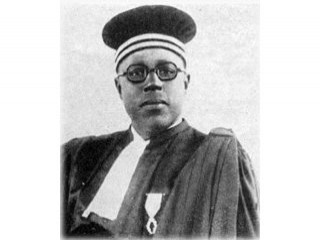
Lamine Gueye biography
Date of birth : 1891-09-20
Date of death : 1968-06-10
Birthplace : Medine(now Mali)
Nationality : Senegalese
Category : Politics
Last modified : 2011-09-13
Credited as : statesman, politician,
Lamine Gueye was a Senegalese statesman. One of the major political leaders of French-speaking West Africa, he attacked the autocratic and discriminatory aspects of colonial rule—never colonial rule itself.
Lamine Gueye was born on Sept. 20, 1891, in Medine in what is today Mali. Completing his education in France, he graduated as a lawyer in 1921. He returned home to found one of Africa's first political parties and in 1924 became mayor of Saint-Louis. In 1937 he became the leader of the Senegalese branch of the French Socialist party (SFIO) and with Leopold Senghor was elected deputy for Senegal to the French National Assembly in 1945. In 1946 he again won the seat of deputy and also the mayoralty of Dakar. In 1948, however, Senghor left Gueye to form his own party, causing Gueye to lose his seat in the 1951 elections. In 1958 Gueye rejoined Senghor in a movement of national reconciliation and in 1959 was elected president of the Senegalese National Assembly, a position that he held until his death in June 1968.
In a career spanning half a century, as the doyen of French African politicians, Lamine Gueye rejected political independence as a solution for the problems of underdeveloped African states:he demanded only that the laws of France be applied equally to all, at home or overseas.
His two books, etapes et perspectives de l'Union Francaise (1955; Stages and Perspectives of the French Union) and Itineraire africain (1966; African Journey), as well as his doctoral dissertation, were efforts to demonstrate the compatibility of French citizenship and African civil status. Two laws passed by the French National Assembly were named after him. The law of May 7, 1946, declared that all the inhabitants of the overseas territories had the rights of citizenship as French nationals. The law of 1950 stipulated that French and African civil servants were entitled to equality of treatment.
Gueye was more than simply the "grand old man" of African politics. He worked hard for his constituency of a mainly urban bourgeoisie, proudly accepting at their face value France's most heroically proclaimed ideals, and acted as a bridge to the period of mass nationalism.
















